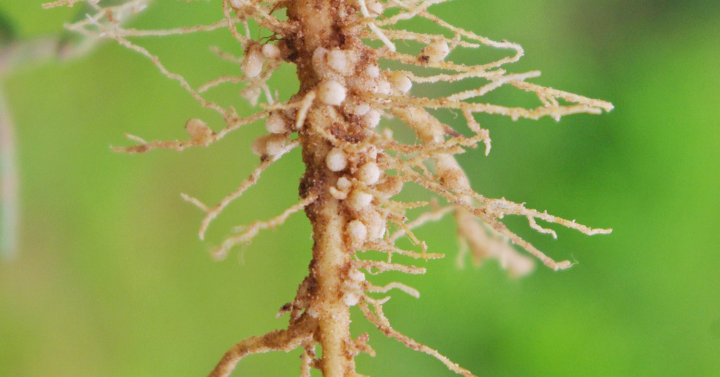Nematodes can be found in abundance in the soil and can be beneficial to plants, as they can eat fungus and bacteria and also improve the overall health of the soil. However, some nematodes can cause certain problems for plants or crops. The most commonly treated nematode pests are root-knot, lesion, cyst, stubby root, sting, and dagger nematodes. Fortunately, most species of nematodes either have no effect or are highly useful for plants. Many species of nematodes are ‘free-living’; i.e., living in soil, sea, and freshwater, and feed on bacteria, fungi, protozoans, and even other nematodes, and play a significant role in nutrient cycling and release of nutrients for plant growth. Other nematodes attack insects and help to control insect pests.
But not all nematodes are beneficial. Most plant-feeding nematodes live in the soil and feed on plant roots, thereby reducing the plant’s uptake of water and nutrients and its tolerance to other stresses such as drought. Some can transmit diseases, including viruses, to plants while they feed on them.
In major crop markets, nematicides are used on crops such as potatoes, corn, soybeans, cotton, fruits, and vegetables to control nematode pests in the soil. While there are both non-chemical and chemical treatments, chemical nematicides have active ingredients that can be applied to soil pre-planting or used in-furrow. The most common forms of nematicides include chemicals, fumigants, and biologicals.
Bayer’s brand, Velum Rise, is a fungicide/nematicide used for the containment of Rhizoctonia, black dot, nematodes, and other soilborne diseases. With two active ingredients, penflufen and fluopyram, Velum Rise provides growers with the ability to combat nematodes and prevent key diseases in potato crops with a single application from early season disease management and nematode suppression. It was approved for sale in the U.S. by the Environmental Protection Agency (EPA) in November 2023.
Corteva’s brand, Salibro, was launched in October 2023 and contains the active ingredient Reklemel. Salibro nematicide controls plant-parasitic nematodes without disrupting the healthy balance of beneficial organisms in the soil. Sustaining a range of beneficial insects, including pollinators, Salibro nematicide can help soil organisms improve soil quality. Salibro nematicide is labeled for use in the following crop groups — nonbearing tree nuts, nonbearing grapes, cucurbits, nonbearing stone fruit, carrots, fruiting vegetables, nonbearing citrus, potatoes, and sweet potatoes — with additional crops and use in bearing, and permanent crops (tree nuts, grapes, and citrus) to be added in subsequent registration submissions.
Reklemel active, the active ingredient in Salibro nematicide, is one of the first new active ingredients registered under the U.S. EPA policy that incorporates Endangered Species Act assessments into the registration process for new pesticides. This new process is a crucial step toward regulatory certainty for farmers and others who rely on important pesticide technology while helping protect listed species and their habitats. Other major brands of nematicides include BASF’s Copeo and Syngenta’s Avicta and Clariva.
Kline’s Agrochemicals group will soon be launching an update to our Global Nematicides study which features both non-chemical and chemical treatments, including the top brands, active ingredients, and suppliers. To be published in 2024, the geographic scope of this global study covers key markets in Europe, Asia, North America, and South America. To set up a meeting to discuss your market intelligence needs, please contact us.

